I went for a photo walk by myself yesterday.
I listened to my favourite accordion street player under the cathedral arches...
I spied on relaxing spots, all pretty with decorative pumpkins...
I saw myself in the future in an unexpected flash-forward...
I discovered the calm of the autumn leaves in spite of the menacing barbed wire...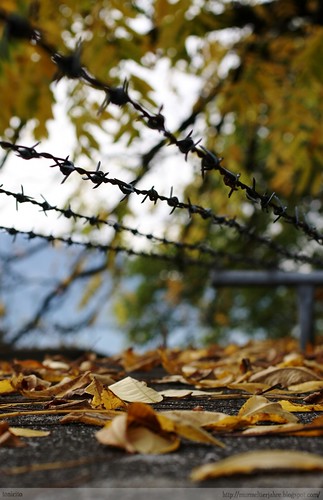
But most of all, I started having fun with our new toy...
Sunday, 3 October 2010
Photo Walk
Sunday, 26 September 2010
Musical rides
This week I did something that I had never done before: I was able to ride my bicycle to and from the office for 5 days in a row, Monday to Friday. Not only do we seldom enjoy such a fine weather for such a long time, it is also very rare for me to get over my weaker self and not to fall victim to any of the numerous excuses at my disposal. I am really proud, I must say.
My ride to the office runs along the Salzach river. For most of the trip I use the bike path, which is a reconverted tow-path, used hundreds of years ago by horses and oxen for towing upstream the boats that, after reaching the salt-mines in Hallein, would be loaded with salt and driven downstream again, to give Salzburg its name (“salt castle”) and to make its prince archbishops awfully rich.
The ride is some 17km long (one-way) and I spend a little less than an hour on it —I am not at all fast! The first two days, especially Tuesday, were quite hard because I got headwind and I was still tired after a hike on Sunday. I got a little obsessed with the cycle computer as well, trying not to do too bad for the statistics. But from Wednesday on, I tried to ignore the computer and simply enjoy the ride.
I realized that there is a kind of physical “in-the-zone” feeling, a delicate and wonderful equilibrium between the force you exert on the pedals and the resistance from wind, road and gravity (slope). That means, there is always a minimum amount of force you have to use in order to maintain a certain pace. The trick is to use just this minimum force, but not more. If you try to keep the pace uninterrupted, by switching gears accordingly, you may be able to run and run with minimal effort and without even realizing the distance.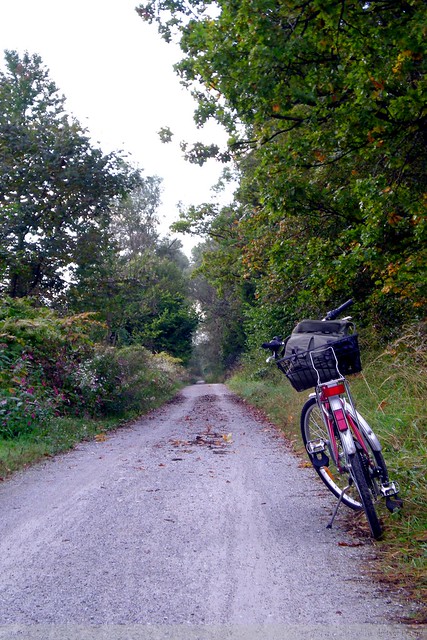
The funny part is that this kind of being “in-the-zone” happens in your mind as well. At least, once I've achieved this equilibrium of forces, my mind seems to become hypnotized by the rhythmic movement and I stop thinking about riding at all and my awareness wanders to other places.
And in this state, invariably, music comes to my mind. I guess it's because the pedalling pace is kind of a metronome that you cannot miss. It's not that I think: Let's sing “Mary had a little lamb”! Songs and melodies simply pop up in my mind. They come and go, without warning, at times switching from one to the other in colourfully wild arrangements that I would certainly not be able to make myself.
This is a selection of some of the melodies that came into my mind during this week's bicycle rides. Interestingly enough, Johann Sebastian Bach seems to have got a stronghold in my brain:
- Prelude from Cello Suite No. 1, BWV 1007, by J. S. Bach
- Variation 1 a 1 Clav., Goldberg Variations BWV 988, by J. S. Bach
- Sinfonia No. 2, BWV 788, by J. S. Bach (listen here)
- Gabriel's Oboe, “The Mission” original soundtrack, by E. Morricone
-
Another composition for two violins by J. S. Bach (I think!) which I can sing but I still haven't found out what it is2nd movement (Largo) from the Concerto for 2 Violins, Strings and Continuo in D Minor, BWV 1043, by J. S. Bach (listen here)
But, without a doubt, this week's winner has been the Prelude from J. S. Bach's Lute Suite No. 4, BWV 1006. Enjoy!
Sunday, 9 May 2010
Der Garten an der Salzach
If you walk by the bus stop on Ferdinand-Hanusch-Platz you might see them, sitting on the four metal seats that are their exclusive territory. Or you may see them go into the supermarket opposite the bus stop, to spend the few coins that they got God knows where. Their purchase is usually just cans of beer, the first one of which they are going to open before crossing the first of the two pedestrian crossings they need to cross to make it to the bus stop.
There they are, sometimes quiet and melancholic, at times vociferous and loud, but always silent witnesses of the other side, society's dark side, that let us remember every day about what could happen to anyone of us, in one of those ugly turns that life can take. A fate that is becoming more and more common and from which we tend to look away or, even worse, blame them for their misfortune; them who are the most fragile link of a society for whose smooth running we all are responsible.
Herr G is one of them. His hours pass slowly between the bus stop and the twenty something meters and two traffic lights to the supermarket, making use of his right to one of the four metal seats and observing the passers-by and people who look nervously at their watches as they wait for their bus to come. In the morning you can see him on the other side of the river, pushing an old and rusty shopping cart where he piles all his belongings up. Carefully, quietly, as the city slowly awakes, Herr G parks his shopping cart in a bend of the cycle path below the bridge. If the weather is nice, he sits on one of the benches nearby that, in the end, is the closest thing to a home that he has.
Because Herr G knows that every home needs a garden, and that's why he has taken two small green patches in front of his benches to plant some flowers, to lay out stones geometrically, to align pine cones, to give shelter to a couple of garden gnomes and even to have a colourful windmill. Herr G sits down on his bench, looks at his toy windmill and smiles in the inside before standing up again and going spend the morning at the bus stop on Ferdinand-Hanusch-Platz.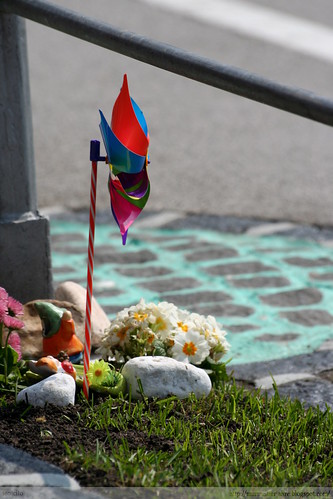
At noon, Herr G will sit down again on his bench and will let the sun warm up his tired joints, staying alert at those two teenagers that are riding their bicycles too close to his garden, ready to scare them away if necessary. Later, Herr G will close his eyes again and will take a nap.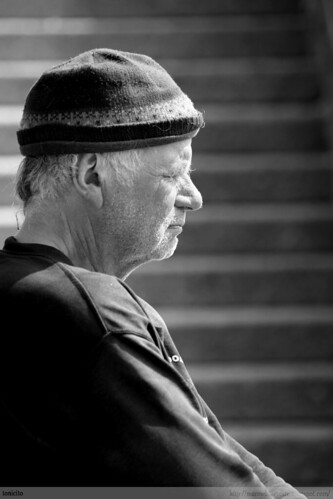
Saturday, 10 April 2010
Sunday, 28 February 2010
The Time Machine
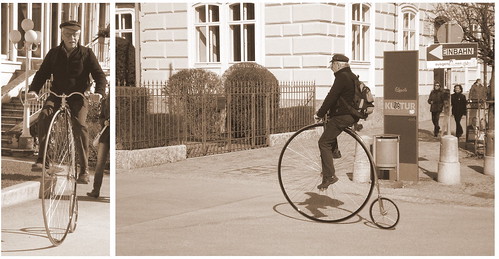
Sometimes you don't really need a time machine to travel back in time, you don't need to risk uneasy encounters with flesh-eating morlocks or being inadvertently trapped inside a mountain.
All you need to do is go for a walk on the river side.
Sunday, 8 November 2009
Chess Autumn (*)
By 1959 New Yorker saxophonist Sonny Rollins, frustrated with what he perceived as his own musical limitations, took what would become the first and most famous of his musical sabbaticals, in order to improve his technique.
During this period Rollins, a resident from Manhattan's Lower East Side, would go to the nearby Williamsburg Bridge, in order to spare a young pregnant neighbour of his the sound of his practice routine.
His comeback album, published three years later, was named "The Bridge". The mythical sight of a lonely saxophone player on a bridge, playing by himself, his dark silhouette over the Moon, is Rollins's.
Sonny Rollins - Without a song, from the album "The Bridge"
Tonight we've been lucky enough to listen to Sonny Rollins live. He has been welcomed by standing ovations even before saying a single word. At 79, the elderly man standing on stage, looking frail and walking with a stoop, has just needed to take his tenor saxophone in his gigantic hands and got two notes from it to make clear that we were in front of a true jazz legend. An experience that will be surely hard to forget.
(*) At least, that's what I understood on my first Autumn living in Salzburg. Someone told me about this great "Chess Herbst" festival, which should be worth attending to. At first I imagined people playing chess all over town. It took me some minutes to realise I was being confronted with the native pronunciation for the word jazz. German speakers tend to close a too much (they don't know about the schwa and the very subtle nuances of neutral vowels) and do not seem to be able to distinguish between the sounds /dʒ/ (as in job or jazz) and /tʃ/ (as in chop or chess).
Tuesday, 1 September 2009
Letting time go by...
The end of summer is near.
The sun that used to enter relentlessly through my office window each afternoon, hides behind the fir trees on top of the mountain faster and faster. A sun that, incidentally, I prefer to face with an open window that, at least, lets some breeze go through, than to follow one of these unfathomable Austrian schools of thought that advocate for closing windows in order to keep the air inside cool. In my opinion, a more than debatable idea that, at most, would be valid in combination with a blind or something opaque for that matter. But this is an invention that still has not made it to my office, unfortunately.
The end of the summer, as I was saying, is near. Summer is the season whose ending I am most excited about. First of all, because summer ending marks the beginning of autumn and this one is truly my favourite season. Secondly, there are many minus points that go away with the summer: it stops being too hot, garbage stops stinking, you are able to sleep at night and people, you know, stop smelling (so) bad... And last, but not least, summer sun is way too intense and its rays fall way too vertical, just to shed light over a uniformly dull green colour that does not allow many fun with photography.
Because, I have to admit it, even if it means being despised by my neighbours, I don't like summer. In fact, summer is the last in my list of favourite seasons: first comes autumn, in quite challenged second and third places winter and spring, and way way back, summer.
Anyway, a good thing about summer are those lazy Sunday afternoons, with nothing more to do than taking a sandwich and your bike, ride half an hour to Hellbrunn, lay down on the grass and let time go by, reading a book, sleeping, eating your sandwich, playing around with nice puppies that come over and, in sum, enjoying today's favourite word: Müßiggang, meaning idleness, otiosity.
Let this Müßiggang ride along with us on our way back home...
Friday, 20 February 2009
It snows
I love it when it snows.
Because your usual pathways are disguised in white and you have to follow the footprints of others before you to walk along them.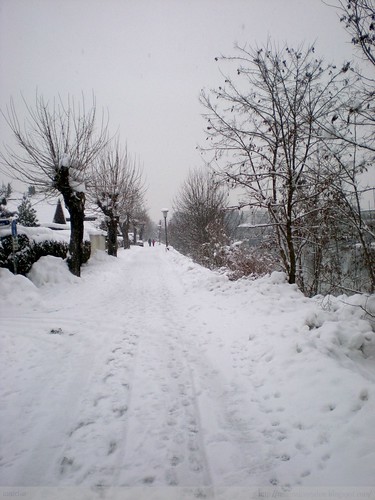
Because if you look at your coat close enough, you might see perfectly formed snow crystals, whose beauty will for sure captivate you.
Because the quietness is almost supernatural. I can hardly imagine of anything more relaxing than looking at the snow falling through a window.
Because I cannot resist passing my hand over the freshly fallen snow.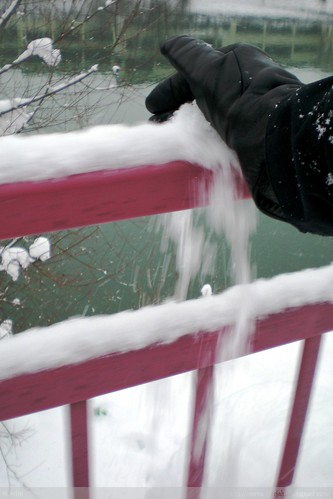
I really love it when it snows.
Thursday, 12 February 2009
Kaffeehaus
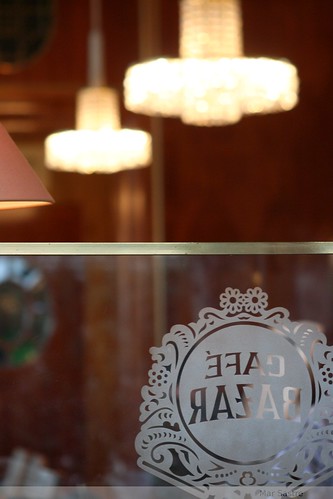
"Wie andere in den Park oder in den Wald, lief ich immer ins Kaffeehaus, um mich abzulenken und zu beruhigen, mein ganzes Leben." (*)
(*) As others to the park or to the woods, I always went to the coffehouse to distract and to calm myself, my whole life.
Thursday, 6 November 2008
Favonius at work
Yesterday morning, as I went out home at 6:45AM, with a scarf around my neck, I was welcomed by an incredibly warm November morning. Even though the Sun had not still risen, we might have had 18ºC! How was that possible? Is it because now, with Obama, it won't be cold in November anymore? ;)
No. It is the Alpenföhn, a unique wind effect that happens near the Alps. When an air mass has to rise to spring over a mountain range, water condenses and falls as rain on the windward side. Past the maximum elevation, the dry air "falls down" the slopes and raises temperatures by as much as 30ºC on the leeward valley.
(Picture taken from Wikimedia Commons)
The name Föhn comes from the Roman God Favonius, who personified the west wind. Later on, it went through Rhaeto-Romance favuogn and fuogn until it reached modern German as Föhn. Interestingly enough, a hair dryer is called Fön, without "h". I read that the name was registered as trademark by AEG on the 20s.
The Föhn is often associated with migraines and psychoses. A study by the Ludwig Maximilian University in Munich claims that suicide and accidents increase by 10 percent during föhn winds in Central Europe. In fact, there is a Föhnkrankheit (Föhn sickness), which might be the perfect excuse to justify low performance on the job, excessive appetite or, simply, general apathy.
Other föhn wind examples around the world include the Chinook in the Rocky Mountains, North America, the Halny in the Carpathian Mountains, Eastern Europe, fogony and cierzo in the Pyrenees and viento del sur (southern wind) in Cantabria, northern Spain.
And I think I'm going to let it go for today, because, you know, there is Föhn today...
Friday, 24 October 2008
Days are getting shorter...
... November is almost here and I already rode my bike to the office for the last time this year ...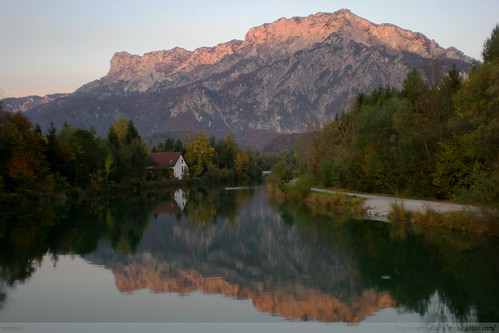
... the Sun strides through its journey in the sky lower and lower, long shadows and wonderful sunset light all day long ...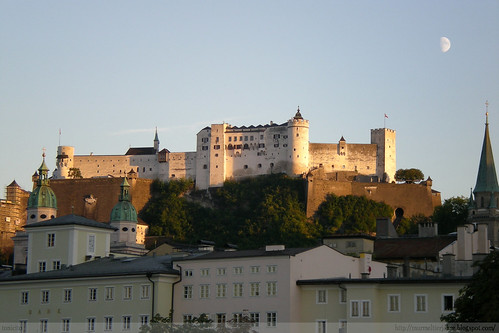
... and Cold and Darkness prepare themselves to rule over the Northern hemisphere for the next months. Strange organic sculptures wander around the city at night ...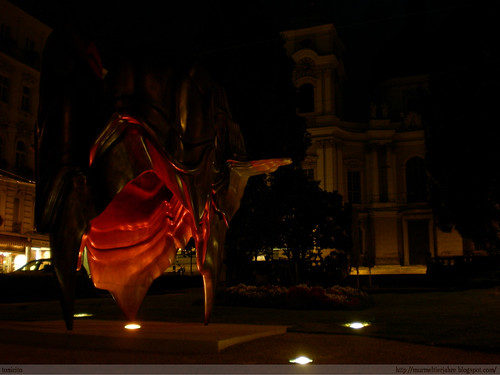
Sunday, 29 June 2008
Hellbrunn's freeloader
This country is so perfectly beautiful that it doesn't seem real. But, if you pay attention, there are some spoungers as well:
Let's go see how the Spaniards do today. To the other side, to the neighbour country. No risk, no fun... ;)
Sunday, 15 June 2008
Euro-impressions
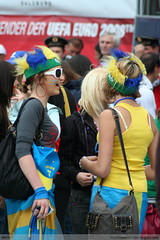

How ya' doing? ;)
Don't you feel much safer now?
Swedish hats...

...and Russian and Greek ones!
What is that on his head?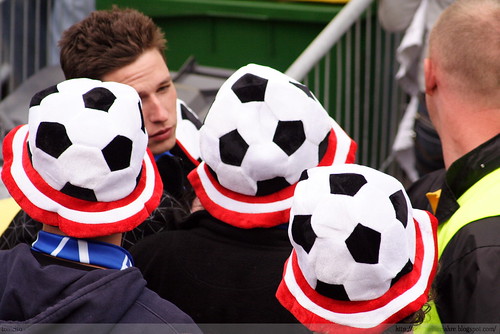
Going in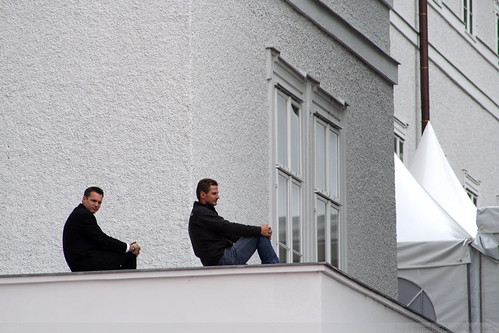
Looking down
I swear it's the last time I bring granny to the fan zone!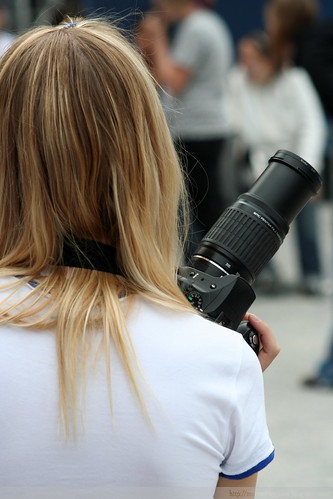
I wasn't the only one...
Monday, 19 May 2008
Sunday, 18 May 2008
Details
Sometimes our feelings follow paths that we don't understand. Sometimes our perception happens at levels that we are not able to trace.
Why are there cities that appear cold? What is that small bit of something that, in spite of all the good, doesn't let you feel quite like home?
Why are there other cities that seem to embrace you with its charme? What is that other something that gives you the feeling you could easily make of that city your home?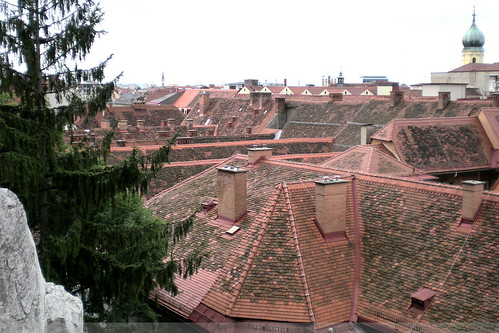
I don't know. Maybe it's just the colour of its rooftops...
Monday, 12 May 2008
Follow your nose
One of the consequences of the enormous evolutive success of the human species has been the loss of contact with Nature. We live in stone boxes, some meters above the ground, days and days can go on without ever touching any soil with our hands, we drink bottled water and almost everything we eat comes on white trays in plastic wrap.
Some of our forefathers' abilities disappeared (as most surely our toes will do). Others are still there, but I do not believe they would be of any use now, had we have to survive and succeed in the hostile environment the first great apes lived in.
Yesterday I was thinking about that as I discovered, on a bicycle tour along the Danube river banks, some cereal ears. I'm pretty sure they are the same ears with which I played as a kid in school. We ripped them off with our pointing finger and thumb (I still can clearly remind the noise they made) to throw them to the other kids, because they would stick to the clothes, especially to wool pullovers. (*)
I was very aware of how the memory was built in my mind, first seeing the ears at the path sides, then picturing myself ripping them off, then touching them, then remembering the noise, and then the warmth of the memory...
On the other hand, when it is a smell that reminds me of something, it comes to me almost immediately, as if the nose had direct line with the memory. Although they seem to be lost memories, they just need the right smell to be made appear sharply, with every little detail, as if I was living that again.
I always thought I have a good sense of smell. I suppose it is to made up for my short-sightedness and a certain increasingly hearing loss. I think smell is one of the most directly connected senses to our brain. Not to the most "conscious" part of it, but to that almost "reptilian" brain that controls our instincts. Because smell was already there before consciousness appeared, and memory was probably there, too.
I like bicycling to the office because, on this time of year, I am able to smell wild garlic even not being able to see it (did I mention my short-sightedness?). I like the different smells that fill up Salzburg's passages depending on the day of the week, depending on the time, depending on the passage. The passage going from Mozart's birthplace and Universitätsplatz smells of coal and sausages every Saturday noon. Close to Konditorei Schatz it always smells of cakes. Balkan Grill's passage always salutes our noses with the smell of a misterious spice blend and Nagano Restaurant's passage smells of soya sauce and seaweed.
I like the sense of smell, because it is proof of our past in the wilderness, as being able to distinguish a threatening smell from the smell of food could mean survival or death. Because it reminds us that we are nothing but little animals, somehow evolved, but still animals. I like it because my heart misses a beat when I smell the loved one behind me. I like it even though sometimes, when people use too much perfume, I almost can't breathe in the lift. I like the sense of smell because, sometimes, it brings about memories of my childhood, as we threw those cereal ears to each other, as we had not started chasing girls yet...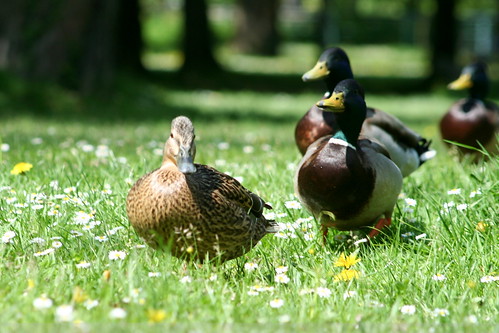
(*) Mar says they called them the boyfriend plants, because the number of ears sticking to you was the number of boyfriends you had...
Tuesday, 11 March 2008
Looking at the pointing finger
"It is said that when someone points to something only dummies look at the pointing finger. But sometimes, to look at the pointing finger allows us seeing the unexpected or simply discovering the ordinary under new points of view.
Toni Palau (Tarragona, 1975) started to look at the pointing finger some years ago in Austria. Through a camera lens."
Today Mateo, from DIVINOTINTO, the one and only Spanish bodega in Salzburg, published my photo exhibition online. You may visit it here, and also my flickr album here. And, beginning on March 25th, you may visit it on site, along with good wine and conversation.
I hope you like it! :)
Sunday, 17 February 2008
Strange(r)
A couple of months ago there was a burglary in a jewellery store in Salzburg. It happened during the night, and the only images of the perpetrator (from a video surveillance camera nearby) showed a masked person breaking through the shop window and taking goods worth around 10.000€. There was no way to find out the identity of the masked robber (it looked like a man, though).
Interestingly enough, the jeweller seemed to have a really extraordinary sixth sense to know, in spite of the mask, in spite of the darkness, in spite of the blurry images, the nationality of the one who robbed him. Or, at least, the geographical location of the robber's home town: to the East of Austria. He (the jeweller) wanted to share his feelings about European Union politics with everyone passing by, and thus displayed a sarcastic "EU-Osterweiterung lässt grüßen!!!" ("Here comes the EU enlargement to the East!!!") on his broken window.
Austria has always been among the countries most opposing accession of any other country to the EU. In fact, Austria is more against the accession of any country (with the sole exception of Croatia) than any other European country. According to Eurobarometer 2006, 62% of Austrians are against the accession of Macedonia, 59% Bosnia-Herzegovina, 73% Albania and 65% Serbia. Only 5% of Austrian people favours the accession of Turkey to the EU. Just to compare, 24% of Greeks are in favour of a Turkish accession.
In an Eurobarometer poll in 2005, 73% of Austrians thought that cultural differences were too significant to allow a Turkish accession. The EU25-average was 54%. Interestingly enough, 60% of Austrians told Eurosearch 2006 that "religion is irrelevant to the question of whether a country should be permitted to join the EU".
What's striking, though, is that other debates on EU enlargement have been masterly lead by Austrian politicians. Eurobarometer polls in 2002 showed 34% of Austrians in favour of a Croatian accession and 51% opposed, whereas 2005 55% favoured it and only 40% opposed. On the contrary, in the case of Turkey, 2002 had 32% of Austrians in favour of an accession and 53% opponents. In 2005 the ratio was 10% (in favour) to 80% (against). There has been little or no effort from politicians to favour a Turkish accession in the past few decades, and now, with support at an extraordinary low level of 5%, no one is willing to address the issue for fear of making themselves easy targets for their political opponents.
Of a population of 8.3 million people, 9.4% are foreigners. Of these, almost 88% are from outside the EU, especially the Balkans and Turkey. A Turkish embassy survey showed that 52% Austrians blame migrants in Austria for problems of integrations. That means, the root of the problems is the refusal by immigrants to integrate. 45% do not believe there is any solution to the integration problem of the Turkish community.
I think that, when it comes to integration, there is some homework to do for both parties. First of all, knowing each other and accepting each other. Me learning your language is not enough. You have to get to know my rituals and, even though you may not share them, at least understand that they are important for me, and respect them. Accepting, and not just tolerating, because to tolerate means an implicit censorship. When it comes to integration, though, I think Austrians are more or less willing to do their part depending on what my passport says.
There is an Italian restaurant in Salzburg, where we are not able to speak German at all, because they don't understand us. They only speak Italian, but this does not seem to bother any of the numerous Austrian guests. They are even celebrated: "Oh, how funny! They can't speak a single word German! They are soo lovely..."
Can you imagine the same comments on a Turkish kebab?
Saturday, 19 January 2008
Sounds of destruction
Every Saturday, exactly at 12:00 a.m., the city alarms of Salzburg (and, apparently, those of every city and town in Austria) are tested for half a minute. Their sound, loud and continuous, always remembers me of air raid alarms. It might well be that they are the old WWII bomb alarms, reused as city sirens...
Salzburg survived the end of World War II relatively well. Its geographical situation, deep into the then-German Reich, kept it out of the reach of Allied bombers well until the death of Mussolini. But its relative strategic unimportance, when compared to more industrial cities like Hallein, Linz or Graz, let it remain mostly ignored even when the Allies where already in Italy.
The bombing raids over Salzburg (with a total of 15) started on October 1944. People would have to run into the city hills, Kapuzinerberg and Festungsberg, into the underground shelters. The Hexenturm (Witches' Tower), part of the old military defenses, not far away of present-day Schrannenmarkt, was literally wiped out. One of the city's water reservoirs, up on the Mönchsberg, was destroyed as well, adding flood to the existing chaos. A bomb even entered the Baroque cathedral, perforating the dome, but it did not explode. Some say Virgin Mary made a miracle...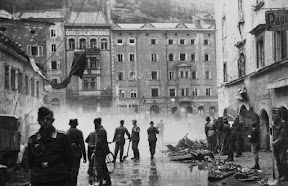

I learned about the air raids over Salzburg in a book that I catched some time ago, an autobiography of playwright Thomas Bernhard, who happened to spend his childhood in Salzburg during WWII.
Fortunately, I have never found myself in a bombing raid, and I do not know how would I act. I think fear would completely paralyse me, but I hope I never know. What I do know is that the only thing that is left is destruction, stillness, emptiness. But we humans do not seem to learn the lesson.
The famous view from the Dresden City Hall Tower comes to my mind. Or the ghostly quietness of the Old Town of Belchite, destroyed by Francoist troops during the Spanish Civil War and kept untouched as a tribute and as a warning.
I hope I'll never know how it feels to walk through the streets of your home town after being destroyed. But I guess it may feel like walking through a forest after a fire. That is an image I for sure will never forget. It was in Vespella, near Tarragona. I had ridden my bicycle to the top of a hill, and at the other side there was nothing but desolated moon landscape for as long as my eyes could reach. Tortured black tree corpses everywhere. Ashes. The smell. The unnatural stillness. Destruction. Absolute emptiness.
Monday, 24 September 2007
Groundhog Event: Rupertikirtag
Today, September 24th, is the Rupertikirtag, the Patron's Day here in Salzburg. Saint Rupert of Salzburg is the patron and protector of the city and state of Salzburg. Even though I've just read in Wikipedia that Rupert's feast day is March 27th, Salzburg always honors him from September 20th to September 24th. Don't ask me why.
The Rupertikirtag is quite interesting, because schools, banks and public authority have the day off. Unfortunately I don't belong to any of these categories, so I had to go to work. There is a kind of funfair (Dult) in the three squares around the cathedral. The fine weather on Sunday was too big a temptation for the hobby photographer in me. Such venues always provide a thousand details that deserve to be photographed!
I like Rupertikirtag. Barcelona's patrona (a female patron), La Mercè, is celebrated on September 24th as well. And Tarragona's one, Santa Tecla, just one day before. It's not quite the same, but I love the coincidence!


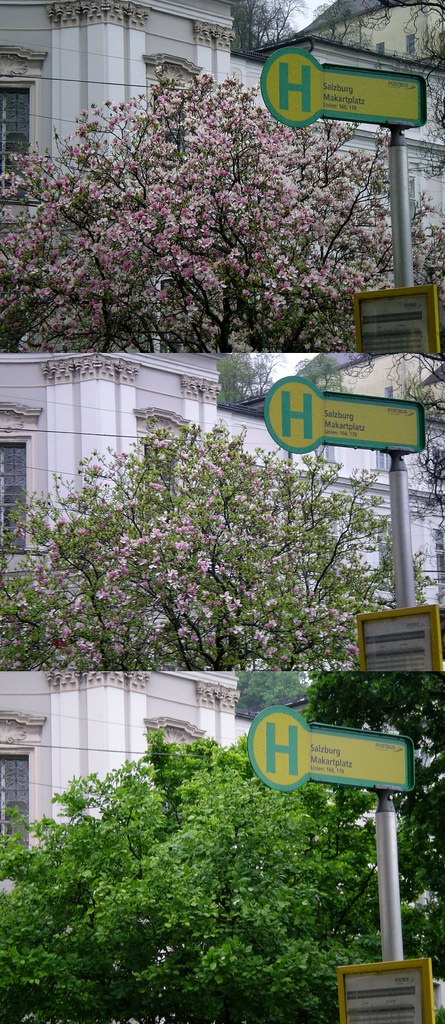
 versión en español
versión en español






